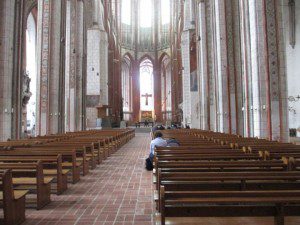 The issue on the table today is how often we should celebrate the Lord’s Supper. Whether we call it mass, communion, eucharist, or the Lord’s Supper, how often?
The issue on the table today is how often we should celebrate the Lord’s Supper. Whether we call it mass, communion, eucharist, or the Lord’s Supper, how often?
Here’s a reality: some today are weekly communicants (Roman Catholics, Anglicans, Plymouth Brethren, Restoration movement churches) while others are monthly, quarterly or annually.
A second reality: some in monthly or quarterly tradition — low church evangelical types — are moving into the weekly churches because they believe the Lord’s Supper ought to be central to worship and because they think the church history pedigree for weekly communication is deeper.
Such is the topic of a chapter in Kenneth Stewart’s In Search of Ancient Roots.
Excellent chapter. His argument is not that evangelicals used to do weekly communion but neither is his argument that Catholics and Anglicans have always done weekly communion. If I get him right, his argument is that it was evangelical scholars — John Erskine and John Mitchell Mason — who probed the question and pressed both the Bible and church history into the discussion.
Thus far, Erskine had sketched a trajectory depicting a weekly administration of the Lords Supper from apostolic times to the year 450, yet with a steadily diminishing regular participation of the bulk of professed Christians. In reliance on the early Christian historian Socrates (b. AD 380), he took the view that the first church to abandon this weekly standard was Rome, followed by Alexandria. By the year 506, he found that in the West the stated expectation for a professed Christians participation in the Lord’s Supper had been lowered to three times per year. For a further two centuries the principle of weekly Communion was upheld in the churches of the East. The process of decline had gone on, almost unchecked, so that by the time of the Council of Trent (1545-1563), the Church of Rome had stipulated that once-annual participation in the Supper was sufficient .
But what about the NT? Here are the major texts used:
Acts 2:42 They devoted themselves to the apostles’ teaching and fellowship, to the breaking of bread and the prayers.
Acts 2:46 Day by day, as they spent much time together in the temple, they broke bread at home and ate their food with glad and generous hearts,
1Cor. 11:26 For as often as you eat this bread and drink the cup, you proclaim the Lord’s death until he comes.
Acts 20:7 On the first day of the week, when we met to break bread, Paul was holding a discussion with them; since he intended to leave the next day, he continued speaking until midnight.
Acts 20:11 Then Paul went upstairs, and after he had broken bread and eaten, he continued to converse with them until dawn; then he left.
It was Erskine and Mason who pressed the history and the NT into the discussion, and they did so both academically and pastorally.
What were their conclusions? I quote six of Stewart’s conclusions:
- Each writer granted, from the outset, that neither Jesus nor his apostles left to the church any actual pronouncement on the subject of frequency of Communion. At best, there are inferences that may be drawn from the New Testament.
- Each agreed that a primitive high frequency of Communion in the first Christian centuries had gradually given way in medieval Catholicism to a minimalist expectation of once-annual participation.
- Each accepted that the now-hallowed Presbyterian practice of annual or semiannual Communion festivals represented an innovation of the early seventeenth century and as such represented a departure from the original Reformation expectation of an at least quarterly administration.
- The annual or semiannual Communion festival—whatever might be said about its evangelistic potentialities for preaching the gospel to the mixed multitudes that gathered—was inadequate to the spiritual needs of ordinary Christians and provided insufficient opportunities for communing with their Lord.
- While each writer was personally convinced that the primitive church had enjoyed the Lord’s Supper weekly and knew that the restoration of that primitive frequency had been the desire of John Calvin, they also accepted that from the time of Constantine the church had declined from its original purity and cohesiveness.
- The common position of Erskine and Mason, therefore, was that evangelical churches and believers needed to resort to the Lord’s Supper more frequently than the Communion-festival practice had allowed—while not attempting to recover precisely the practices they believed were characteristic of apostolic times. A quarterly, six-times-yearly, or monthly Communion all represented a giant step in the desired direction, and they asked for no more at that time.











